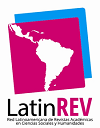Social sciences and law: social sciences in legal education
DOI:
https://doi.org/10.24215/18522971e031Keywords:
Social Sciences; Legal Education; JurisprudenceAbstract
In this work I will offer an approach to some of the problems that arise in the relations between social science and jurisprudence. In order to achieve the goals, I will use a linguistic approach following Elizabeth Mertz research about legal education and her reflections about the role that social sciences have on it. The work will be developed in two sections. In the first one, there will be presented some crucial ideas about studies of language use and the translations problems that appear when scholars try to apply social sciences results and theories in the legal realm. Then, I will present the results of Mertz’s investigation about legal education and how social sciences are taught in American law schools. In the second section I will make some critical considerations about jurisprudence and will show some differences when compared with social sciences to, finally, explore the challenges that has to face a legal education that intends to be both independent from practice and, at the same time, relevant to it. I will show, then, some reasons to try to develop a legal education model in which social sciences are not a mere ornament nor a something strictly derive from practice itself.
Downloads
References
Austin, J. L. (1962). Cómo hacer cosas con palabras. Barcelona: Paidós.
Begala, S y Lista C.. (2014). La sociología como campo de conocimiento especializado en la formación de abogados. En: https://www.academia.edu/33291797/La_sociolog%C3%ADa_jur%C3%ADdica_como_campo_de_conocimiento_especializado_en_la_formaci%C3%B3n_de_los_abogados.pdf
Begala, S. (2003). “La presencia del mensaje educativo en la conciencia de los estudiantes: resultados de la socialización en un modelo jurídico dominante”, en Revista Academia, Año 1, Número 2..
Bovino, A. y Courtis, Christian. (2009). “Por una dogmática conscientemente política”, en Desde otra mirada. Textos de teoría crítica del Derecho. Buenos Aires: Eudeba, 2da. Edición.
Calsamiglia Blancáfort, H y Tusón Valls, A. (2002). Las cosas del decir. Manual de análisis del discurso, Barcelona: Ed. Ariel.
Carrió, G. (1957). “Sobre las creencias de los juristas y la ciencia del derecho”, en Revista Lecciones y Ensayos, Vol. VI, pp. 27-37.
García Villegas, M. y Rodríguez Garavito, C. (2003). “Derecho y sociedad en América Latina: propuestas para la consolidación de los estudios jurídicos críticos”, en Derecho y sociedad en América Latina. Un debate sobre los estudios jurídicos críticos.
Jakobson, R. (1984), Ensayos de lingüística general, Barcelona, Ariel.
Kennedy, D. (1995). Politizicing the classroom. En: http://www.duncankennedy.net/documents/Politicizing%20the%20Classroom.pdf
Lavandera, B. (1985). Curso de lingüística para el análisis del discurso, Buenos Aires: Centro Editor para América Latina.
Lista., C. y Begala, S. (2005). “El discurso jurídico en la ensenianza jurídica: entre lo instruccional y lo regulativo”, en VI Congreso de Sociología Jurídica, Buenos Aires,
Lista, C. y Brígido, C. (2002). La enseñanza del derecho y la formación de la conciencia jurídica, Córdoba: Sima Ediciones.
Lucy, J. (1993). “Reflexive language and the human disciplines”, en Reflexive language. Reported speech and metapragmatics. New York: Cambridge University Press.
Manzo, M. (2008). “La influencia de la educación jurídica en la formación valorativa de los abogados”, en Revista Academia, Año 6, Nro. 11
Mertz, E. (2007). “Inside the law school classroom: toward a new legal realist pedagogy”. En: http://ssrn.com/abstract=1719235
Mertz, E. (2010). The language of the law school. Learning to think like a lawyer. La Verge (USA): Oxford University Press.
Mertz, E. (2008). “The role of social science in law: introduction”. En: htpp://ssrn.com/abstract=1711222
Mertz, E. (2011a). “Social science and the intellectual apprenticeship: moving the scholarly mission of law school forward”. En: http://ssrn.com/abstract=1992532
Mertz, E. (2011b). “Undervaluing indeterminacy: translating social science into law”. En: http://ssrn.com/abstract=1988179
Mertz, E. y Yovel, J. “Metalinguistic awareness”, en The handbook of pragmatics, Ed. Jan-Ola Ostman, Jef Verschueren, Jan Blommaert, Chris Bulcaen. Disponible en: http://works.bepress.com/jonathan_yovel/15/.P.4.
Nino, C.S. (2014) Introducción al análisis del Derecho. Buenos Aires, 2da. Edición ampliada y revisada, 17ava. Reimpresión: Astrea.
Pattaro, E. (1980). Filosofía del derecho. Derecho y ciencia jurídica. Madrid: Reus.
Siedman, S. y Alexander, J. (2004). The new social theory reader. Contemporary debates, New York, Routledge.
Downloads
Published
How to Cite
Issue
Section
License
Los autores/as conservan los derechos de autor y ceden a la revista el derecho de la primera publicación, con el trabajo registrado con la licencia de atribución, compartir igual, de Creative Commons, que permite a terceros utilizar lo publicado siempre que mencionen la autoría del trabajo y a la primera publicación en esta revista.

Derecho y Ciencias Sociales por Facultad de Ciencias Jurídicas y Sociales se distribuye bajo una Licencia Creative Commons Atribución-CompartirIgual 4.0 Internacional.

























